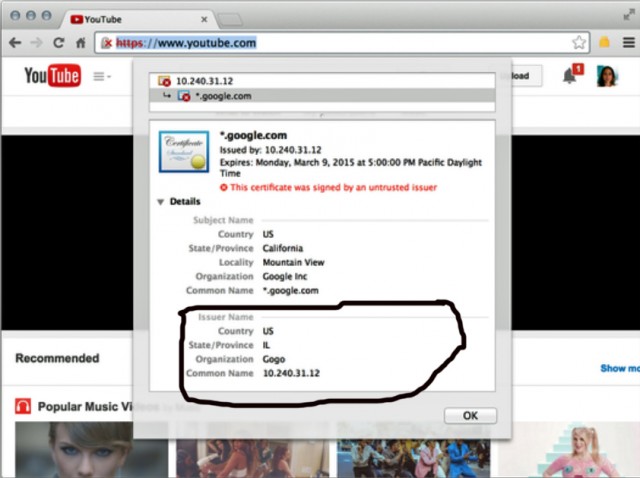- Apr 25, 2013
- 5,355

Gogo has been caught issuing a fake digital certificate for YouTube, a practice that in theory could allow the inflight broadband provider to view passwords and other sensitive information exchanged between end users and the Google-owned video service.
Normally, YouTube passwords, authentication cookies, and similar site credentials are securely encrypted using the widely used HTTPS protocols. A public key accompanying YouTube's official HTTPS certificate ensures that only Google can decrypt the traffic. The fake certificate Gogo presents to users trying to access the video site bypasses these protections, making it possible for Gogo to decipher data. It has long been Gogo's policy to block access to streaming sites and other bandwidth-intensive services. A company official said the fake YouTube certificate is used solely to enforce the policy and not to collect data intended for YouTube. Security and privacy advocates criticized the technique anyway, characterizing it as heavy-handed.
The certificate came to light late last week when Adrienne Porter Felt, an engineer in Google's Chrome browser security team, posted a screenshot of the HTTPS certificate Gogo issued her when she visited YouTube. Rather than being signed by a recognized certificate authority, the credential was signed by Gogo itself. In fairness to Gogo, the fake certificate would generate warnings by virtually all modern browsers. Still once users click an OK box, the bogus credential would allow Gogo to decrypt any traffic passing between end users and YouTube.
"hey @Gogo, why are you issuing *.google.com certificates on your planes?" Felt wrote in her tweet.
In response, Gogo Chief Technology Officer Anand Chari issued a statement reminding users of the company's no-streaming policy. He went on to say Gogo uses several techniques to block them. Since Google began automatically HTTPS-encrypting YouTube, such blocks presumably must find a way around that protection. Otherwise, users trying to visit HTTPS-protected pages will receive a security warning when presented with the Gogo blocking message. In any event, Chari said, no sensitive data is being decrypted.
"We can assure customers that no user information is being collected when any of these techniques are being used," he wrote. "They are simply ways of making sure all passengers who want to access the Internet in flight have a good experience."
The statement provided little comfort to many security and privacy advocates. For one thing, the fake certificate at least theoretically gives Gogo the ability to monitor and collect traffic sent between YouTube and any visitor who accepts the bogus credential. No ISP or broadband provider should exercise this type of control, these critics say. On the other hand, Gogo has a legitimate interest in blocking YouTube, and unfortunately, the site's mandatory use of HTTPS limits the ways the inflight service can enforce it in a manner that's transparent and easy to understand.
Mandatory HTTPS connections have long been the bane of people using so-called "captive-portal" Internet services offered by hotels and conferences. Typically, such services redirect first-time users to a terms of service page before they can browse the Internet. Those redirections often stall when users first try to visit encrypted webpages, creating a hugely frustrating problem for end users, broadband providers, and website operators alike. While this is a hard problem to solve, Gogo's current approach sets a bad precedent. Promising not to monitor or collect sensitive data isn't the same thing as being unable to do it. The entire premise of HTTPS is at stake.